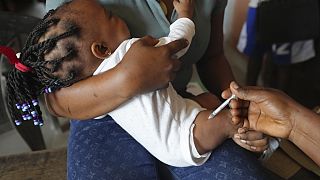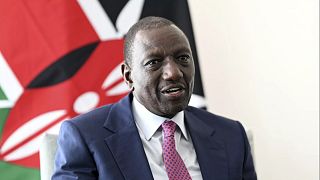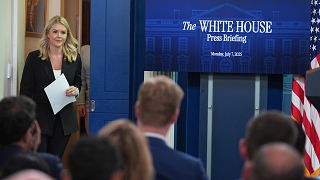Kenya
**Belinda Adhiambo has lived in Kibera, Kenya's largest slum her entire life. It's a large impoverished neighbourhood that is constantly growing in the heart of the capital Nairobi. **Here paying a doctor could mean missing a meal.
Now Kenyan start-up Snark Health believes it's found a way to enable more people to get qualified medical attention without having to pay for it with cash.
When Adhiambo needs medical attention she looks for a doctor through the Snark app.
Her medical data is anonymized by Snark and sold to pharmaceutical or consumer health companies.
After an accident at the age of just 3 years old, Adhiambo's leg had to be amputated. She still suffers from phantom pains and needs medical help.
In return for medical attention, Adhiambo allows Snark Health to store and sell her health data, it means she doesn't have to pay.
The data she gives to the company gives her a credit which Snark describes as virtual "Hippocratic coins".
Adhiambo says she wouldn't be able to afford health care any other way.
She says: "Most of these insurance covers do not cover persons with disabilities because of our diversity. We have different needs. So the first time I tried the app was when I had some phantom pains and I realized that I was able to book an appointment and meet a doctor and I had a conversation with a doctor and he guided me on how to go on the phantom pain. For me it is an achievement because sometimes when I want to go to a hospital, for a phantom pain I need to have some money for consultation and everything. But with the app I only ask Dr Nick if I can see him through the app, if I can see him in his available hours and he was like yeah you can just come and we will sort that out with the app owners."
Today Adhiambo is visiting orthopaedic doctor Nick Were who believes the application is a good idea which benefits doctors as well as patients.
"I have been using this application for about two years, and it has really changed the way I practice. I am now able to put my available times on the application and the patient on the other side is able to see the time. This has improved the time management such that the patient does not have to wait for too long and now I am also able to earn through the app," he says.
Doctors get paid in various ways to incentivise them to join up to the app.
When they see patients like Adhiambo who cannot pay, they receive 10% of the cash Snark earns from selling her anonymized data.
If a paying customer also agrees to the collection and sale of their health data they will get an equal share of the cash earned, so Snark, the doctor, and the patient each earn a third of the money made through the sale of the data.
The founder of Snark Health is Edwin Lubanga. He explains the app means the patient has access to doctors regardless of funds.
Lubanga says: "Snark is a platform that connects patients with doctors to narrow networks for diagnosis and treatment. Basically patients log into the platform using their android app, using their smartphone or they can use an SSD code if they do not have internet access to find a list of doctors and book appointments and consult them on the go."
According to Lubanga it's also a way for fee paying patients to make extra money.
"When a patient logs onto our platform he has two choices either to take part in our data monetization program or simply pay via M-PESA via cash and proceed to book a consultation. If they choose to be part of our data monetization, which again all our data is all anonymised, they will earn at least 33% or a third of our earning from our data sale," he says.
According to Snark the patient's rights are protected because the company is a certified processor of data which complies with protocols laid down by the Office of the Data Protection Commissioner.
Lubanga says the patient's sensitive health information can't be traced back to them.
"Once it's anonymized that means that we will never know, the encounter is just between the doctor and the patient and we cannot trace back to which particular patient was diagnosed with what. The algorithm is only picking out the information we are researching. So lets say a data customer is searching for specific things like malaria patterns happening in a certain side of the country, then Snark is able to show all these analytics."
Austin Omune is the Chief Executive and co-founder of Negus Med Limited. Not connected to Snark Health, the company aims to improve healthcare via innovative technology.
Omune says he supports the idea.
"While working as a doctor we experience patients struggling to meet the payment needs so, of course there is a need for innovations to address this challenge and I think Snark Health puts us down that path in a way that healthcare data can be monetized and thus used to offer these vital services. And I believe there is a lot of room for growth. There is always of course controversy over healthcare data so it would have to be safeguarded which Snark Health may be able to provide by using various technologies such as blockchain encryption and also having an efficient way of storing this data and protecting it for every party involved."
According to Snark, the app has so far attracted more than 300 doctors and 4,000 patients.
In Kenya accessing medical services can be expensive. Many living in poverty have no means of getting to see doctors or attending hospitals.
The World Health Organization says around 4.5 billion people globally are not covered by any essential health service - that's half the global population.












00:28
Nairobi hawker shot at close range by police declared brain dead
01:50
Faith Kipyegon falls short of historic sub-four minute mile but vows to keep pushing
Go to video
Kenya's Interior minister accuses protesters of coup attempt after deadly demos
00:48
Death toll in Kenyan anti-government protests rises to 16, says rights group
01:07
Kenya prepares for first anniversary of Finance Bill protests
01:52
UN's crucial humanitarian aid work faces a clouded future amid cuts in funds